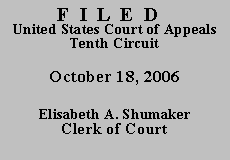

| UNITED STATES OF AMERICA, |
|
| v. | |
| LOUIS GABRIEL ARCHULETA, |
Pursuant to a plea agreement, defendant/appellant Louis Gabriel Archuleta pled guilty to three counts of bank robbery, in violation of 18 U.S.C. § 2113(a). He was sentenced to three concurrent terms of 188 months' imprisonment, followed by three years of supervised release, and he was directed to pay $300 in special assessment fees and $23,318.89 in restitution. Archuleta has filed a timely appeal.
Archuleta's appointed counsel, Raymond Moore, has filed an Anders brief and moved to withdraw as counsel. See Anders v. California, 386 U.S. 738 (1967). Archuleta has not filed a response, and the government has declined to file a brief. We therefore base our conclusion on counsel's brief and our own careful review of the record. For the reasons set forth below, we agree with Mr. Moore that the record in this case provides no nonfrivolous basis for an appeal, and we therefore grant his motion to withdraw and we dismiss this appeal.
BACKGROUND
There is no dispute as to the facts relevant to Archuleta's guilty plea. As set forth in the plea agreement, on three separate occasions in April and May 2005, Archuleta entered three separate financial institutions in Denver, Colorado, and demanded money. On two occasions he threatened bank employees with a fake bomb. Archuleta was arrested on May 19, 2005, and he admitted that he robbed banks with fake bombs and further admitted his involvement in the three above robberies.
At his change of plea hearing, Archuleta was advised of the penalties for the offenses of conviction, of his right to counsel and to a jury trial, of his right to the presumption of innocence, to have his guilt established beyond a reasonable doubt, to confront the witnesses against him, to be free from compelled self-incrimination, and to compulsory process. He indicated he understood those rights and that, by pleading guilty, he was foregoing those rights. As a factual basis for the plea, Archuleta adopted the recitation of facts in the plea agreement.
At Archuleta's sentencing hearing, the court calculated an advisory sentencing range of 151 to 188 months under the United States Sentencing Commission, Guidelines Manual ("USSG") (2004). The court further determined that Archuleta was a career offender under USSG §4B1.1, based upon his current crime of conviction and two prior felonies.(1) After analyzing the sentencing factors set forth in 18 U.S.C. § 3553(a), the court sentenced Archuleta to 188 months, the top of the advisory guideline range. This appeal followed.
DISCUSSION
Under Anders, "counsel [may] request permission to withdraw [from an appeal] where counsel conscientiously examines a case and determines that any appeal would be wholly frivolous." United States v. Calderon, 428 F.3d 928, 930 (10th Cir. 2005) (citing Anders, 386 U.S. at 744). This process requires counsel to:
submit a brief to the client and the appellate court indicating any potential appealable issues based on the record. The client may then choose to submit arguments to the court. The court must then conduct a full examination of the record to determine whether defendant's claims are wholly frivolous. If the court concludes after such an examination that the appeal is frivolous, it may grant counsel's motion to withdraw and may dismiss the appeal.
Id. (citing Anders, 386 U.S. at 744). In his Anders brief, Archuleta's counsel observes that "the only possible avenues for appeal would be irregularities in the guilty plea, or sentencing errors." Appellant's Op. Br. at 5.
"[A] plea is valid if it represents a voluntary and intelligent choice among the alternatives open to the defendant." United States v. Gigley, 213 F.3d 509, 516 (10th Cir. 2000). Furthermore, Fed. R. Crim. P. 11 requires the district court to make sure that the defendant is aware of the consequences of a guilty plea, including all rights waived by entry of a guilty plea. The record in this case reveals that the district court fully complied with Rule 11 and that Archuleta's guilty plea was knowing and voluntary. There is accordingly no nonfrivolous basis for challenging the guilty plea.
Similarly, the record reveals no nonfrivolous basis for challenging the sentence imposed on Archuleta. The district court correctly calculated an advisory sentence under the guidelines, then considered all of the 18 U.S.C. § 3553(a) factors before determining a reasonable sentence.
CONCLUSION
For the foregoing reasons, we GRANT counsel's motion to withdraw and we DISMISS this appeal.
ENTERED FOR THE COURT
Stephen H. Anderson
Circuit Judge
*.This order and judgment is not binding precedent, except under the doctrines of law of the case, res judicata, and collateral estoppel. The court generally disfavors the citation of orders and judgments; nevertheless, an order and judgment may be cited under the terms and conditions of 10th Cir. R. 36.3.
1.In fact, Archuleta has a very extensive criminal history, which, with thirty-one criminal history points, garnered him a criminal history category VI. At his sentencing hearing, Archuleta confessed to having been "locked up for 36 years out of my 44 years of age." Tr. of Sentencing Hr'g at 11, R. Vol. III. The district court characterized Archuleta's criminal history as "terrible" and observed that "it is extremely rare[] that [the court] see[s] someone . . . with 32 criminal history points." Id. at 15.